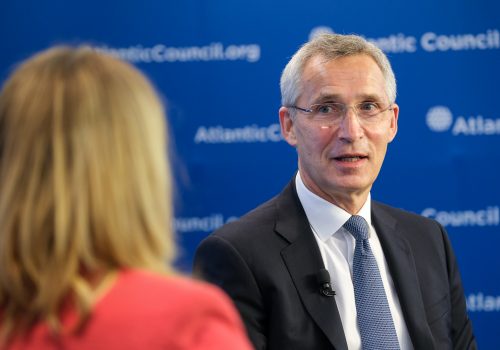The future is here: A guide to the post-COVID world 06/11/2021
Welcome to your guide to where the world is headed during the pandemic era and beyond, from Andrew Marshall. Each week, we’ll bring you the latest and most significant expert insights and international news about how coronavirus is reshaping international affairs. To stay updated each week, sign up to the newsletter here.
Let’s take a spin around the globe, in seven minutes or less.
In top stories this week:
- NATO’s role now includes preventing pandemics. How should it go about that?
- As the Group of Seven (G7) summit kicks off, revisit the numbers behind the pandemic-ravaged economy.
- The latest incentive to get people vaccinated.
- But first, a special dispatch from the GeoEconomics Center on how people armed with stimulus checks and extra time at home are taking over finance.
The big story
This week’s key theme: Is the new age of finance decentralized?
The GameStop saga of January 2021 sent shockwaves across Wall Street. Tens of thousands of investors—encouraged by a Reddit thread, sitting at home thanks to the pandemic, and empowered by online trading apps—sent the stock price of the struggling video game retailer “to the moon.” At one point, GameStop had gained roughly 18,700 percent in value. Some said the democratization of finance had arrived.
But democracy can be messy. Robinhood and TD Ameritrade abruptly restricted most transactions, causing the price to crash to just one-fourth of its intraday high. US Senator Ted Cruz (R-TX) and US Representative Alexandria Ocasio-Cortez (D-NY-14) found themselves on the same side of the issue. Regulators in DC were unsure of what to do next.
GameStop was just the beginning. Last week, AMC became the latest beneficiary of the masses.A huge spike has now put the stock up an eye-popping 2,000 percent for the year. These so-called “meme stocks” all benefit from decentralized finance or DeFi.
DeFi is a new way to complete transactions on apps. These apps run on blockchain and essentially could make banks, brokerages, exchanges, and other intermediaries irrelevant. DeFi proposes removing all the fees, processing times, delays, and risks associated with banking today. It brings finance to the masses and makes finance fast.
So what happens when DeFi finally clashes with traditional finance? We may be about to find out. The US Securities and Exchange Commission (under the leadership of its new chairman, Gary Gensler) is tasked with coming up with regulations to limit any illegal activity happening through DeFi. But Gensler has been clear he has no desire to stifle innovation.
Instead of trying to turn back the clock, some businesses are finding ways to lean in. AMC started tweeting out encouragement for its new investors, even offering free popcorn whenever people feel comfortable returning to the theater.
Other companies think this is all a passing fad. After all, the US Federal Reserve has injected trillions into the markets, COVID-19 relief checks have hit people’s pockets, and all that money has to go somewhere. Once things settle out, finance will be more “rational,” or so the thinking goes.
The reality is that we’ve entered a new era of finance and we may never look back. The attraction is easy to understand. DeFi is much more popular with younger generations, especially Millennials and Gen Z, who may have an ax to grind with traditional finance. A recent report by the Fed shows that Millennials hold only 4.8 percent of total US wealth. When Boomers were the same age Millennials are today, they held almost five times that share. Millennials came of age during the 2008 financial crisis, entering an economy in crisis with limited job prospects and a lot of student debt. Now, Gen Z is coming of age in the midst of the first pandemic in a century. Anger and resentment have exploded in fervent support of new systems that circumvent traditional institutions entirely—cryptocurrencies, non-fungible tokens (NFTs), and more.
All great revolutions in finance have been met with skepticism. Think of the invention of paper money in China a thousand years ago, or the advent of printed checks in England in the eighteenth century. But history teaches us the revolutionaries and the old guard often come together to craft a smarter financial system. Innovation is the lifeblood of any well-functioning market, and DeFi may just be the next great financial innovation.
Subscribe to The future is here: A guide to the post-COVID world
Sign up for a weekly roundup of top expert insights and international news about how coronavirus is reshaping international affairs.

The world in brief
Insights from across the planet, in ten bullets or fewer
- The United States is preparing to buy 500 million doses of the Pfizer vaccine to donate to the world. The move comes ahead of this weekend’s Group of Seven summit and after increased pressure on rich countries to do more to distribute vaccines around the world. “Of the 1.77 billion doses of Covid vaccines administered globally, 28% have been in the world’s richest nations, while just 0.3% of vaccines have been given in low-income countries,” CNN cited Oxfam International as saying last week. “Sharing vaccines now is essential for ending the acute phase of the pandemic,” World Health Organization Director General Tedros Adhanom Ghebreyesus told reporters Monday.
- Resistance to vaccination mandates is rising in Texas. Employees of Houston Methodist hospital walked out after being told they had to be vaccinated. Ashton Handley, an employee who resigned over the issue, told Fox News, “I’m not on either side, I’m not anti-vaxxer, I’ve received my vaccine, but I believe it should be someone’s choice.” Texas has passed a law saying that businesses that require customers to be vaccinated will be denied state contracts. “Texas is open 100%, and we want to make sure you have the freedom to go where you want without limits,” Governor Greg Abbott said.
- The latest incentive to persuade people to get vaccinated: marijuana. “’Joints for Jabs’ is officially a thing in Washington state,” reports USA Today. “The state’s Liquor and Cannabis Board said this week that it would allow state-licensed cannabis retailers to ‘provide one joint to adult consumers who receive COVID-19 vaccination at an in-store vaccination clinic.’”
- Leaving work when the pandemic struck was hard. Going back may be harder. “This is really complicated,” Teresa Gerton told NPR. She is president of the National Academy of Public Administration, a nonpartisan group that advises government leaders. She added that “It is not as easy as flipping a switch and just saying everybody back.” Some people are resisting a return. “Apple employees are pushing back against a new policy that would require them to return to the office three days a week starting in early September,” The Verge reports, adding, “Staff members say they want a flexible approach where those who want to work remote can do so.” The Economist in its Daily Chart pointed out that “Employees say they work more productively at home, but that might be wishful thinking.”
- There’s good news for fans of British pubs: “The percentage of pub and bar owners who had ‘high confidence’ in their establishment surviving the next three months passed 20% for the first time since November 2020,” the UK government’s statistical body reported. The bad news: that’s still low. The report from the Office for National Statistics is entitled “Economies of ale: pubs in the time of COVID-19,” proof that statistics offices have a sense of humor too.
- All those books written in a COVID-19 frenzy last year are starting to emerge in newly reopening bookstores. The Plague Year: America in the Time of Covid by Lawrence Wright, a staff writer at the New Yorker, is one of the most hotly expected. The Premonition: A Pandemic Story is by author and financial journalist Michael Lewis. Historian Niall Ferguson has written Doom: The Politics of Catastrophe. But once we can head back into the pub, will anyone still feel like reading about the pandemic?
The inside scoop
Insights from the Atlantic Council
Andrew Marshall is the Vice President of Communications for the Atlantic Council. He leads the Council’s media, digital, and editorial efforts, and coordinates the way the Council talks with its key communities.




